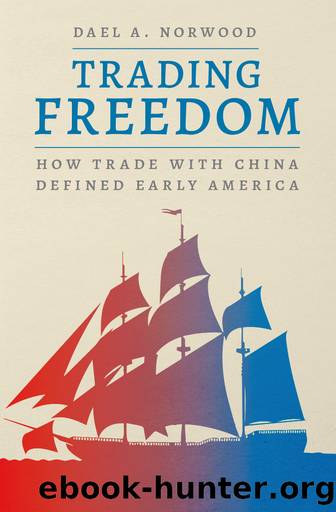Trading Freedom by Dael A. Norwood

Author:Dael A. Norwood [Norwood, Dael A.]
Language: eng
Format: epub
Tags: Business & Economics, Economic History, Foreign Exchange, History, General, Asia, China, United States, Revolutionary Period (1775-1800), 19th Century
ISBN: 9780226815589
Google: n0xNEAAAQBAJ
Publisher: University of Chicago Press
Published: 2022-01-18T16:18:06+00:00
No minister was ever received in this country as he has been and no mission was ever more popular. The Embassy was honored by a reception on the floors of Congress, the treaty was ratified by a unanimous vote of the Senate, the press of all parties endorses the action of the government, the President heartily approves of the objects of the mission, and the people everywhere, irrespective of political parties, are in favor of the policy established toward the Chinese.98
The Herald exaggerated the bipartisan comity, but it did not inflate Washingtonâs support, which was consistent even across a rancorous election year and presidential transition. Although the administrations were driven by very different politicsâJohnson fighting until the end for a reconciled white manâs government, Grant (at first) embracing a firmer commitment to multiracial democracyâthey both found the Chinese embassy useful as an example of the persuasive power of American diplomacy.
Secretary of State Hamilton Fish explained the continued official support in a long letter to historian George Bancroft, then serving in Berlin as US minister to North Germany. The âgreat principleâ of the 1868 treaty, Fish said, was âthe recognition of the sovereign authority of the imperial government at Pekin over the people of the Chinese empire and over their social, commercial, and political relations with the western powers.â Burlingameâs treaty, Fish averred, âwas a long step in another directionâ from both the âEuropean-Chinese policyâ of âisolationâ and âdisintegrationâ and the high-toned isolationism that Chinese statesmen had pursued out of fear of the political and economic consequences of greater trade with the West.99 Like Williams, Burlingame, and Seward, Fish saw Chinese immigration to the United States as critical to the development of the Pacific Coast and the nationâs ânew position in the commerce of the worldâ that the Pacific Railroad was making a reality. Fish also predicted that the growth of US commercial powerâunderwritten by migrant laborâwould call forth a corresponding increase in the number of Americans settling in Chinaâs treaty ports, because it would augment overall trade. To promote this virtuous cycle and encourage the continuance of the âcooperative policyâ more generally, Fish directed Bancroft, and other US diplomats, to support the Burlingame missionâs efforts in Europe.100
An eminently respectable conservative in Grantâs cabinet, Fish managed the State Department with the same controlled diligence and attentive care he took with his large New York estates. Once he adopted them, the principles of the 1868 treaty guided Fishâs personnel decisions as well as his policy statementsâleading to J. Ross Browneâs firing and informing the instructions to his replacement, Frederick F. Low. Fish even cautioned the navy to be wary of trusting any officers who took foreign merchantsâ peculiar âviews of the Chinese character and governmentâ too seriously, lest US influence in Asia be weakened through rash anti-Chinese actions, as Britainâs had been.101
President Grantâs first annual message, issued in December 1869, made this support for Burlingameâs mission public. After reviewing how the United States was faring after âemerging from a rebellion of gigantic
Download
This site does not store any files on its server. We only index and link to content provided by other sites. Please contact the content providers to delete copyright contents if any and email us, we'll remove relevant links or contents immediately.
Harry Potter and the Goblet Of Fire by J.K. Rowling(3046)
Never by Ken Follett(2883)
Shadow of Night by Deborah Harkness(2718)
Ogilvy on Advertising by David Ogilvy(2682)
Zero to IPO: Over $1 Trillion of Actionable Advice from the World's Most Successful Entrepreneurs by Frederic Kerrest(2397)
The Man Who Died Twice by Richard Osman(2300)
Machine Learning at Scale with H2O by Gregory Keys | David Whiting(2293)
Book of Life by Deborah Harkness(2263)
How Proust Can Change Your Life by Alain De Botton(2261)
My Brilliant Friend by Elena Ferrante(2224)
0041152001443424520 .pdf by Unknown(2220)
The Tipping Point by Malcolm Gladwell(2205)
How to Pay Zero Taxes, 2018 by Jeff A. Schnepper(2100)
Will by Will Smith(2043)
Purple Hibiscus by Chimamanda Ngozi Adichie(1982)
Hooked: A Dark, Contemporary Romance (Never After Series) by Emily McIntire(1963)
Borders by unknow(1786)
Rationality by Steven Pinker(1765)
Daughter of Smoke and Bone by Laini Taylor(1744)
